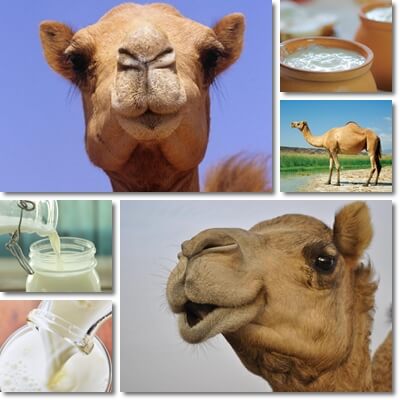If you’ve ever wondered why camel’s milk is a healthy food, then know it boasts some pretty wonderful nutritional properties and health benefits. First of all, it nourishes the brain and combats brain fog or mental fatigue. It supports learning and memory and helps boost focus. Camel’s milk is less allergenic than cow’s milk and is a better choice for those lactose intolerant. It’s also satiating and energizing, has anti-diabetic action, tonic and restorative properties as well as strengthens the immune system. It’s no wonder why it’s the go-to dairy choice of desert communities since pre-modern times.
1) Less allergenic than cow’s milk
Studies show camel’s milk lacks beta-lactoglobulin and beta-cassein, two proteins found in other types of milk, including cow’s. These two proteins are also at the center of milk protein allergies and the source of allergy to cow’s milk. The lack of these specific proteins is the reason why camel’s milk is better tolerated by those that exhibit symptoms of milk allergy when drinking cow’s milk. Research on children with both cow and goat milk allergy showed many of them tolerate camel’s milk with no adverse reactions, despite experiencing allergy symptoms to cow and goat’s milk (study: Camel milk: an alternative for cow’s milk allergy in children. Allergy Asthma Proc. 2011).

2) Food for the brain
With an average of 3.2-3.4 g of fat for every 100 ml, camel’s milk is a moderate source. However, studies report it contains a healthy fat profile, high in unsaturated fatty acids such as Omega-6 (linoleic acid). Together with modest amounts of cholesterol, unsaturated fatty acids feed the brain, serving as a source of energy which allows it to operate at maximum capacity.
3) Good for brain fog
Foods that are also sources of fat, such as camel’s milk, are good for brain fog. Brain fog is a form of mental confusion that causes foggy thinking and lack of mental clarity. It has been described as a sort of mental fatigue or brain tiredness and comes with symptoms such as difficulty focusing, trouble memorizing and remembering things, difficulty communicating ideas and feelings and even a general state of indifference, idleness, lack of motivation or interest. In addition to sleeping more and reducing stress, eating better can help reduce and prevent brain fog. And foods that are sources of fat, such as camel’s and other types of milk, appear to be effective for brain fog.
4) Helps with brain development in children and supports memory and learning
Fat occurring naturally in food plays a big part in brain development in children (after all, the brain is made of fats) as well as supports cognitive functions such as attention, memory and learning. The fat in camel’s milk (unsaturated fatty acids – Omega-6, cholesterol, phospholipids, triglycerides) nourishes the brain and supports its activity.

5) Protects nerve cells
Cholesterol, unsaturated fatty acids and vitamin B12 actively contribute to the myelin sheath, the protective coating surrounding the tail of nerve cells. The myelin sheath works as insulation, allowing electrical impulses to flawlessly go from nerve cell to nerve cell and ensure the communication between brain and body. A severe deficiency of vitamin B12 or other nutrients that help maintain the myelin sheath is believed to cause demyelination (the loss myelin sheath) which is a leading factor in degenerative diseases of the nervous system such as ALS or multiple sclerosis.
6) Natural probiotic
In desert communities where it’s the default milk choice, camel’s milk is most often consumed raw, either fresh or fermented (naturally, as a result of exposure to heat/lack of refrigeration and the action of the microorganisms present naturally in the raw milk). Both the fresh and fermented milk hold probiotic properties as a result of containing live beneficial bacteria and other microorganisms. These enrich the good intestinal flora of the human gastrointestinal tract and help it grow its populations for better digestive health.
A healthy gut flora means benefits for the entire body:
– you digest food better;
– you absorb nutrients from food more efficiently;
– you produce your own B vitamins (all of them) and vitamin K2;
– you don’t get sick with stomach bugs as often or as bad because you have strong, healthy populations of gut bacteria that inhibit the growth of disease-causing bacteria;
– you recover faster from gastrointestinal infections;
– you enjoy a steady, healthy weight and don’t gain weight;
– there are even benefits for mental health. Find out more about how gut bacteria affects your health.
7) Promotes recovery from viral diarrhea
Viral diarrhea is what is commonly known as ‘the stomach flu’ or ‘viral gastroenteritis’. It’s caused by viral agents, or viruses. Since the cause is viral, the body recovers by itself, thanks to the immune system. But the recovery can be short and easy or long and difficult. And this is a time when a healthy gut flora really helps. First of all, healthy, strong populations of good gut flora don’t allow a stomach virus to affect you too much. Eating foods for healthy gut bacteria, such as raw or fermented camel’s milk, helps support good gut flora.
Secondly, camel’s milk being 88-90% water, it can be consumed for rehydration purposes (both diarrhea and vomiting dehydrate, which is the most problematic aspect of diarrheal diseases). Thirdly, the raw milk, whether fresh or fermented, makes a great recovery food as it supplies live beneficial bacteria that help rebuild good gut flora populations. Lastly, its nutritional properties make the milk a restorative, strengthening food. Good amounts of potassium, sodium as well as other minerals and B vitamins give it tonic, revitalizing properties.
8) Natural remedy for heartburn relief
Milk has been long used for heartburn relief thanks to its many properties which are conducive to soothing palliation. Camel milk too can produce similar effects, but only as a short-term remedy and only if consumed in small amounts (a couple of mouthfuls, followed by standing/walking until digestion is complete and refraining from food until you enjoy relief from the heartburn). The milk, which should be consumed cold, coats the irritated lining of the esophagus and stomach and actively soothes the mucosa which provides almost instant relief from heartburn. Minerals such as magnesium and calcium further counteract the acidity in the stomach.
It’s also a low-fat milk – there is research that shows fat content can be as low as 1.2-1.8%, although it’s usually in the 2.9-3.4% range. The lower the fat content, the better since fat can trigger stomach acidity when consumed in excess. Secondly, it has a pH of 6.63 to 6.97, which is close to neutral (7). The weak acidity means it will not likely add to stomach acid production. However, it’s best used sparingly because it can also cause stomach acidity and heartburn if consumed in excess.
9) Boosts immunity
Immunoglobulins and lactoferrin (proteins) and lysozyme and lactoperoxidase (enzymes) in camel’s milk hold antibacterial, antiviral and antifungal properties and actively engage the immune system for a stronger response. Live, beneficial bacterial cultures in raw camel’s milk further enrich the gastrointestinal flora which contributes to better immunity long-term. The enzyme lactoperoxidase further hold anticancer activity.
10) Anti-diabetic action
First of all, the good protein and fat content and the low lactose content make camel’s milk a low glycemic food, meaning it contributes to a steady, controlled rise in blood sugar levels. Its effects extend over other foods, usually ones with high glycemic values. Secondly, the milk has been found to contain the hormone insulin which is apparently not affected by gastric juices and can pass into the bloodstream from where it is absorbed into the bloodstream and contributes to benefits for blood sugar control.
11) Lower lactose content than cow’s milk
Camel’s milk has been found to have lower lactose values than regular cow’s milk (although the nutritional value of the milk differs according to various factors, including diet, seasonal and hormonal changes, age and state of health of the camel). On average, whole camel’s milk is 3.2 to 3.6% lactose, cow is 4.6 to 5% lactose, while sheep 5.1 to 5.36% lactose and goat 4.4 to 5% lactose. The lower content makes it a potentially good substitute for cow and even sheep and goat milk for those with milder forms of lactose intolerance (who can still have regular milk in small amounts, but still experience some symptoms so would benefit from a lower lactose content).
12) Satiating and energizing
The good amounts of fat and protein in camel’s milk make it a satiating food choice that helps keep you full for longer and provides long-lasting energy. Being relatively low in sugar, the milk combats high and lows in terms of energy by preventing fluctuations in blood sugar levels. Good amounts of potassium and calcium along with modest amounts of magnesium have tonic properties, while B vitamins have a revitalizing effect.
